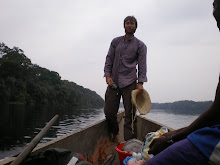Oh there are exciting moments. Bonobos of course. Snakes. The freakishly intense thunderstorms. But these occurrences, for me, are scattered amongst a fairly repetitive daily routine. At the risk of sounding ungrateful, it can be pretty boring here. I wake up before dawn. I drink coffee and eat papaya. I hike the same 7 km stretch of trail every morning just to sit at the same boate tree. Sometimes I see bonobos, sometimes I don't. In the afternoon, I walk the same 7 km trail back to camp. I eat fish (sometimes with rice, sometimes with pasta-variance!). I'm in bed by 8 pm. Conversation around the dinner table almost invariably revolves around three things: food, bugs, and bonobos.

Food-What we are eating, what we want to eat, the first thing we will eat when we get back to the states. Like I've said, I really enjoy the food here. The fruit and fish are fresh and organic-there are no hormones or fertilizers or anything like that. Sometimes, although not as often as we would like, a pineapple or a few avocados (coveted like gold) will wander into camp changing our moods for the day. Peanuts are almost always available. Along with my daily exercise routine (push-ups and sit-ups), the multi-vitamins, and the long distance walking (I estimate I will cover approximately 450 miles this summer)-the food has helped me get into a pretty healthy state of being. That being said, I would give a kidney for a chocolate milkshake.

Bugs-It seems every time I come to Africa I start a journal entry with a sentence that goes something like this- "My sister Jen could not handle Africa. She hates bugs and they pretty much run the joint." So I was mindful not to start this entry with that sentence. But it is true-she couldn't deal. I've been bitten by mosquitoes, no-see-ums, chiggers, tsetse flies, ants and probably a dozen other 6 legged critters. My arms and legs look like a chicken pox convention. Even the caterpillars, with their barb-like hairs, leave burning, blistering welts on skin unfortunate enough to brush up against one lounging camouflaged on a leaf. Of course its the spiders the size of LeBron James' hand that would send Jen packing for the nearest 4 star accomodations. The crickets would probably freak her out too-they're everywhere.
And then of course there are the bonobos-By any account, the summer has been pretty frustrating as far as observing bonobos here at Ndeli. We've seen them a handful of times and had a couple of really good observations, but after spending nearly 2 months and over $25k on this research trip-well, we are a bit disappointed. Last week, however, a small contingency from the African Wildlife Foundation (AWF) arrived in camp (thankfully breaking up our routine AND bringing Nutella!) and invited me to check out Iyema, a site that had not had researchers present since 1998, when the civil war here erupted and the scientists were escorted from the forest at gun point. After an hour pirogue (hollowed out tree canoe) ride downriver and a 15 km backpack trip through the forest reserve, we managed to find the overgrown remains of the camp. The old thatched huts were barely standing and the open areas around them had been reclaimed by saplings and ground cover, but the bonobo nests found on an evening walk were promising. The forest itself is quite beautiful and in the light of the overcast day it maintained a silver palor that cast a haunting effect.
Only 15 km from my site at Ndeli as the crow flies, I was hopeful that I might actually get a couple of fecal samples to see if there are any related individuals between the two sites. (Female bonobos disperse once they are sexually receptive as an inbreeding avoidance adaptation, while the males stay in the natal group.) At the moment, no one knows how far or in what type of pattern the females are dispersing. The collection of any genetic material could conceivably help refine models of our own evolution as bonobos and chimpanzees are our closest living relatives and their behavior can, with a number of assumptions, be applied to our earliest ancestors.


The trip paid off. Within an hour of slow and quiet walking (maybe 700 meters) from the base camp, Mangue and I found a group of approximately 20 bonobos-more than I had seen all summer at Ndeli and one-tenth of the distance away. The group consisted of an enormous male, several mothers with infants, and a couple of curious adolescents that actually moved closer to us. Bonobo jackpot! With only enough food for one night, and with the AWF folks needing to keep moving, we were forced to return to Ndeli to resupply. Tomorrow, however, we will return to Iyema for five days. Tent time. No internet. Long walk in but short walks once we get there. Its back to old school primatology. We'll soon see if the comforts of Ndeli have made me soft. At least the trip will break the routine. It certainly shouldn't be boring.

